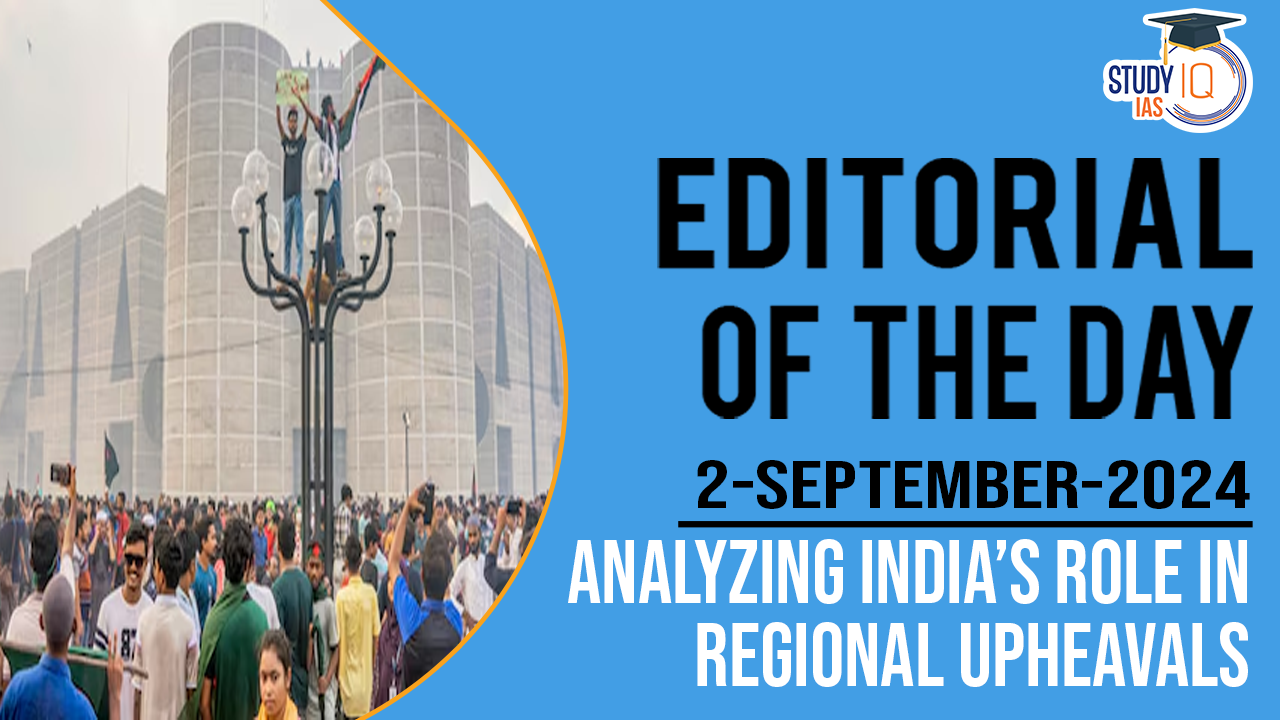Table of Contents
Context: Over the last few decades, India has seen significant changes in its neighbourhood which have influenced its foreign policy and diplomatic strategies.
What were the changes in The Neighbourhood?
Between 2008-2010
- Bangladesh:
- In 2008, after military rule under General Moeen U. Ahmed, Sheikh Hasina became Prime Minister in 2009 with a strong mandate.
- India, particularly through the efforts of External Affairs Minister Pranab Mukherjee, played a catalytic role in ensuring elections were held without military interference.
- Outcome: Over 15 years, India and Bangladesh formed a mutually beneficial partnership, with the Hasina government being sensitive to India’s core interests.
- Sri Lanka:
- In May 2009, the Liberation Tigers of Tamil Eelam (LTTE) were defeated after 33 years of conflict.
- India’s sustained engagement with Sri Lanka played a significant role in this outcome, which was not widely acknowledged.
- Outcome: The defeat of LTTE allowed for closer India-Sri Lanka relations.
- Maldives:
- In 2008, after 30 years of Maumoon Abdul Gayoom’s autocratic rule, Mohamed Nasheed won the first multi-party democratic elections.
- India supported the stabilisation of this nascent democracy.
- Outcome: The Maldives saw democratic maturity over the next 16 years, with three different Presidents elected in three consecutive elections.
- Myanmar:
- In 2010, Myanmar held elections after 20 years of military rule, leading to the victory of the military-backed Union Solidarity and Development Party (USDP).
- India’s involvement helped in Myanmar’s slow transition towards democracy.
- Outcome: The National League for Democracy (NLD), led by Daw Aung San Suu Kyi, won landslide victories in 2015 and 2020, strengthening democratic roots.
- Pakistan:
- In 2008, Pakistan elected a civilian government, leading to the exile of President Pervez Musharraf.
- India observed this change but played a limited role.
Overall Outcome
India witnessed an exponential increase in development assistance to its neighbours such as
- Rebuilding of northern Sri Lanka
- Extending the biggest-ever line of credit ($1 billion) to Bangladesh
- Connectivity projects in Myanmar
- Budgetary support to stabilise the fledgling democracy in the Maldives.
Present Situation (2024)
- Bangladesh:
- In August 2024, Sheikh Hasina’s government collapsed due to a democratic deficit, economic downturn, and violent suppression of protests.
- India was caught off guard and failed to maintain engagement with Bangladesh’s opposition, raising questions about its biased support towards Hasina.
- Sri Lanka:
- In 2022, Sri Lankan President Gotabaya Rajapaksa fled the country due to being unable to control a series of mass anti-government “Aragalaya” protests led mostly by apolitical irate public and youth.
- This resulted in the failure of democracy and the economy.
- In response India provided a timely bailout package of about $4 billion, helping stabilise Sri Lanka’s economy.
- This resulted in improvement of India’s engagement across the political spectrum regardless of election outcomes.
- Maldives:
- In 2024, India did not anticipate the landslide victory of President Mohamed Muizzu and failed to engage with him earlier.
- India is now making amends by extending friendship and patience to the new Maldivian government.
- Myanmar:
- The military took over in February 2021, despite the NLD’s 2020 electoral victory. The conflict has since spilled over into India’s northeast.
- India faces a dilemma in choosing between supporting the military for security reasons or siding with the rejuvenated opposition forces.
- Afghanistan:
- In August 2021, the Taliban captured power, reversing two decades of progress.
- India had anticipated the Taliban’s return and had cautioned the U.S., but was excluded from U.S.-Taliban engagements. Now, India is focusing on protecting its geopolitical interests in Afghanistan.
- Pakistan:
- In 2022, the civilian government was overthrown, probably with the military’s involvement, which is a common pattern in Pakistan’s history.
- India has maintained a cautious approach, with limited engagement due to the complex dynamics.
Lessons and Future Strategy
- Sustained Engagement: India needs to engage more consistently with all political factions in neighbouring countries, not just those in power, to better anticipate changes.
- Avoiding Bias: India’s over-reliance on individual leaders, such as Sheikh Hasina, has proven problematic. A broader engagement strategy is necessary.
- Adapting to Change: India must be prepared to adapt its strategies quickly in response to unexpected changes, as seen in Sri Lanka and the Maldives.
- Developmental Diplomacy: India’s developmental support remains crucial. Even the Taliban’s restraint in attacking Indian projects highlights the value of such initiatives.


 100 Years of CPI: Origins, Ideology, Fre...
100 Years of CPI: Origins, Ideology, Fre...
 Santhali Language: History, Script, Cons...
Santhali Language: History, Script, Cons...
 Why India Needs Its Own Economic Model?
Why India Needs Its Own Economic Model?

























